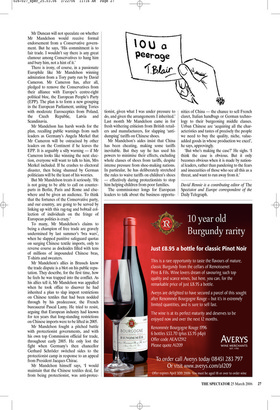Mr Duncan will not speculate on whether Mr Mandelson would
receive formal endorsement from a Conservative government. But he says, ‘His commitment is to fair trade. I wouldn’t say there is any great clamour among Conservatives to hang him and bury him, not a hint of it.’ There is irony, of course, in a passionate Europhile like Mr Mandelson winning admiration from a Tory party run by David Cameron. Mr Cameron has, after all, pledged to remove the Conservatives from their alliance with Europe’s centre-right political bloc, the European People’s Party (EPP). The plan is to form a new grouping in the European Parliament, uniting Tories with moderate Eurosceptics from Poland, the Czech Republic, Latvia and Scandinavia.
Mr Mandelson has harsh words for the plan, recalling public warnings from such leaders as Germany’s Angela Merkel that Mr Cameron will be ostracised by other leaders on the Continent if he leaves the EPP. It is arguably a silly warning — if Mr Cameron looks like winning the next election, everyone will want to talk to him, Mrs Merkel included. If he crashes to electoral disaster, then being shunned by German politicians will be the least of his worries.
But Mr Mandelson treats it seriously. ‘He is not going to be able to call on counterparts in Berlin, Paris and Rome and elsewhere and be given an audience. To think that the fortunes of the Conservative party, and our country, are going to be served by linking up with this rag-tag and bobtail collection of individuals on the fringe of European politics is crazy.’ To many, Mr Mandelson’s claims to being a champion of free trade are gravely undermined by last summer’s ‘bra wars’, when he slapped punitive safeguard quotas on surging Chinese textile imports, only to reverse course as docksides filled with tens of millions of impounded Chinese bras, T-shirts and sweaters.
Mr Mandelson’s allies in Brussels know the trade dispute is a blot on his public reputation. They describe, for the first time, how he feels he was trapped into the conflict. As his allies tell it, Mr Mandelson was appalled when he took office to discover he had inherited a plan to slap import restrictions on Chinese textiles that had been nodded through by his predecessor, the French bureaucrat Pascal Lamy. He tried to resist, arguing that European industry had known for ten years that long-standing restrictions on Chinese imports were to be lifted in 2005.
Mr Mandelson fought a pitched battle with protectionist governments, and with his own top Commission official for trade, throughout early 2005. He only lost the fight when Germany’s then chancellor Gerhard Schröder switched sides to the protectionist camp in response to an appeal from President Jacques Chirac.
Mr Mandelson himself says, ‘I would maintain that the Chinese textiles deal, far from being protectionist, was anti-protec tionist, given what I was under pressure to do, and given the arrangements I inherited.’ Last month Mr Mandelson came in for fresh withering criticism from British retailers and manufacturers, for slapping ‘antidumping’ tariffs on Chinese shoes.
Mr Mandelson’s aides insist that China has been cheating, making some tariffs inevitable. But they say he has used his powers to minimise their effects, excluding whole classes of shoes from tariffs, despite intense pressure from shoe-making nations. In particular, he has deliberately stretched the rules to waive tariffs on children’s shoes — effectively daring protectionists to stop him helping children from poor families.
The commissioner longs for European leaders to talk about the business opportu nities of China — the chance to sell French claret, Italian handbags or German technology to their burgeoning middle classes. Urban Chinese are ‘acquiring all the characteristics and tastes of precisely the people we need to buy the quality, niche, valueadded goods in whose production we excel’, he says, approvingly.
‘But who’s making the case?’ He sighs. ‘I think the case is obvious. But it only becomes obvious when it is made by national leaders, rather than pandering to the fears and insecurities of those who see all this as a threat, and want to run away from it.’ David Rennie is a contributing editor of The Spectator and Europe correspondent of the Daily Telegraph.























































 Previous page
Previous page